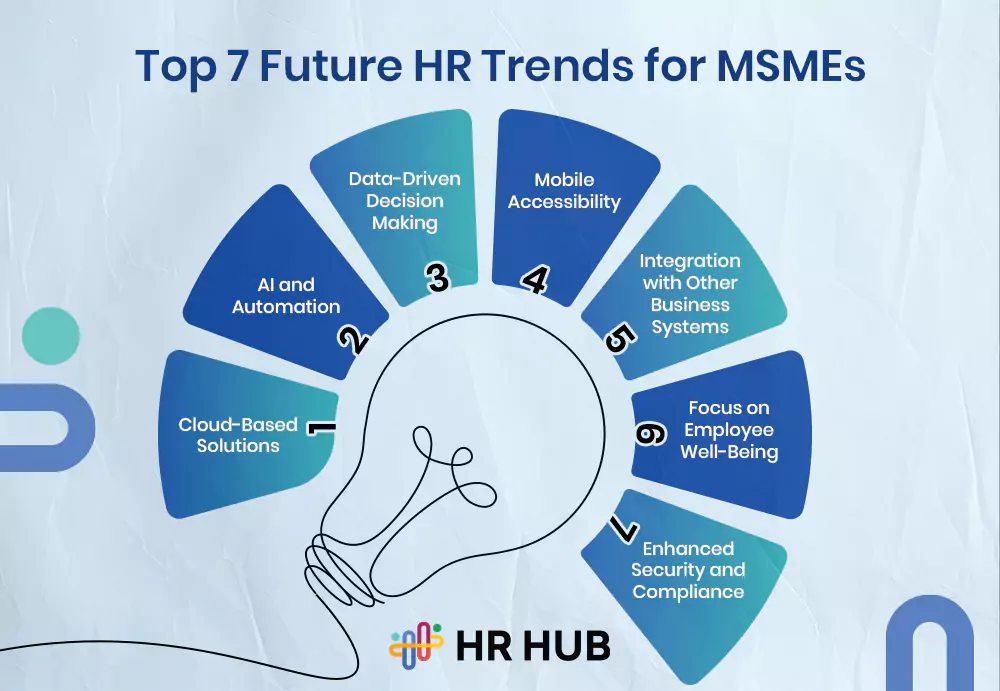Micro, Small, and Medium Enterprises (MSMEs) have been progressing to inculcate cutting-edge Human Resource Management Systems in their operations. These systems, combined with Artificial Intelligence, Cloud Computing, and Data Analytics technologies, are helping MSMEs automate primitive tasks and simultaneously level the playing field against big businesses.
Embracing these innovations can help MSMEs, among other things, better their HR capabilities for recruiting and retaining talent to succeed in today's competitive environment. This blog investigates some of these trends and provides insights into how technology can be harnessed for effective HR management.
Top 7 Future Trends of HR Management
Let's explore the best 7 future trends that will overcome the futuristic technologies of HR Management.
1. Cloud-Based Solutions
Key Benefits
- Accessibility: Cloud-based HR software like HR HUB offers 24/7 access to data and HR functionalities from anywhere with an internet connection. This is a critical advantage, especially for MSMEs with remote or distributed teams; it enables employees and managers to execute HR tasks.
- Cost savings: Cloud-based HR management software solutions eliminate costly on-premises infrastructures and IT maintenance. Subscription-based pricing models allow MSMEs to scale their HRMS usage as per businesses' needs without any hassles, with the cost pegged based on features required and capacity.
- Automatic updates: The cloud provider takes responsibility for updating the software and patching for security, relieving the MSME from this chore. This approach minimizes downtime and allows the business to focus on its core while leaving the management of IT to others.
Future Directions
- Hybrid Cloud Models: As businesses scale up, hybrid cloud models that offer the benefits of private and public clouds will be used by many. This will allow MSMEs to keep sensitive HR data in private clouds but will gain from the scalability and flexibility of public cloud use for other HR activities.
- Increased Adoption: Cloud-based HRMS is now being adapted to a larger scale as more MSMEs start to realize benefits like reduced IT complexity and improved business agility. This, again, will fuel competition among HRMS players to innovate and create solutions tailor-made for small businesses.
2. Artificial Intelligence and Automation
Key Benefits
- Recruitment Automation: AI-driven automation in talent acquisition can automate candidate screening, match job descriptions, and conduct preliminary interviews using chatbots. With the help of the recruitment software solution, you can efficiently reduce the time to hire and help identify top candidates more efficiently.
- Personalized Employee Experience: AI can evaluate massive amounts of data related to an employee to create personalized experiences and communication approaches. This helps keep the employee more engaged and satisfied with his work.
- Efficiency Gains: Automation eliminates the drudgery of repetitive tasks-entering data, processing payroll using HR and Payroll software, and compliance reporting. By doing away with all these administrative responsibilities of HR professionals, MSMEs can then refocus on those strategic HR imperatives that will actually have a material impact on business growth.
Future Directions
- AI-Driven Insights: AI algorithms underpinning workforce analytics will deliver deeper insights than before. They will predict employee turnover, identify skill gaps, and even optimise workforce planning. This will empower MSMEs to make well-informed decisions regarding HR matters.
- Intelligent Chatbots: AI-based chatbots will provide instant answers to common HR questions regarding policy queries and benefit enrollment, thus allowing staff to tackle more complex issues. Such chatbots are likely to be considerably advanced, able to understand human language, and even imbued with knowledge acquired from interactions.
- Automation of Complex Tasks: Automation will not stop at the normal routine but extend to the more intricate HR processes associated with performance appraisals, succession planning, and talent management to streamline operations and enhance accuracy.
3. Data-Driven Decision Making
Key Benefits
- Performance Metrics: HR management software solutions like HR HUB that have data analytics will help monitor key performance indicators for every employee and across departments that comprise the whole organization. KPIs can identify high performers and monitor productivity while looking out for signs of dips in performance and corresponding underlying causes.
- Predictive Analytics: By analyzing past HR data, it is possible to predict future trends, such as recruitment requirements, training needs, and potential attrition rates. These predictions help MSMEs plan for the future and budget resources.
- Employee Engagement: Data analytics can check the state of employee sentiment, the level of engagement, and the drivers of satisfaction or dissatisfaction. This enables MSMEs to implement specific interventions to improve employee engagement and, therefore, retention.
Future Directions
- Real-Time Analytics: The future of real-time data analytics is being directed at instant changes within a workforce, allowing MSMEs to respond immediately based on the situation at hand and help them make decisions more effectively.
- Advanced Visualization: Complex HR data will be simplified through sophisticated data visualization tools in intuitive charts and dashboards, facilitating the interpretation of insights and communication of findings.
- Integrative Data Sources: HRMS platforms like HR HUB have a performance management system that can easily integrate data from various sources, such as performance reviews, employee surveys, and external market data, to give a 360-degree view of the workforce's trends and allow for holistic decisions.
4. Mobile Accessibility
Key Benefits
- Convenience: With the ability to perform HR functions anywhere and time, mobile-enabled HRMS systems give employees flexibility when using their smartphones or tablets. This kind of access is especially useful for field workers or those in remote locations.
- Real-Time Communication: Mobile access sends alerts as changes in HR policies or approvals occur, ensuring that employees are aware and resulting in greater workplace transparency.
- Increased Productivity: Mobile access eliminates any potential HR process bottleneck regarding leave approvals, expense reimbursements, and other such matters by facilitating timely decision-making with less or, if possible, no back-and-forth communication.
Future Directions
- Mobile-First Design: The future direction would, therefore, be designing HRMS platforms based on a mobile-first design and ensuring that all functionalities and features are well-optimized for use on mobile devices. This change in design would address the growing number of employees who prefer to perform different work-related tasks on their mobile devices.
- Enhanced Security: Sensitive HR data accessed via mobile devices will be protected by advanced security, including biometric and two-factor authentication. These measures will comply with security standards and protect data privacy.
- Offline Functionality: Moving forward, some of the important features of HRMS platforms will be available offline, getting data in synchronization once a connection to the internet is established.
5. Integration with Other Business Systems
Key Benefits
- Unified Data: Integrating HRMS with other business systems, such as accounting and project management tools, creates one version of the truth for data, enhancing overall reporting accuracy, reducing manual data entry errors, and providing an enterprise-wide view of the business.
- Streamlined Processes: Integrated systems eliminate duplication and drastically cut the number of workflows requiring duplicate entries and manual reconciliation. This increases efficiency and allows the HR team to engage in strategic initiatives.
- Better Collaboration: An integrated system allows for an easy flow of relevant HR data across cross-functional teams, effectively facilitating better collaboration with each other. More access means better-informed decisions and better departmental alignment.
Future Directions
- APIs and Connectors: Strong APIs and connectors will make it easier for an HRMS to integrate seamlessly with other business tools. These technologies will allow MSMEs to configure their HRMS ecosystems to best fit their particular needs.
- Interoperability Standards: The industry will define these standards to ensure that data exchange becomes common across platforms and systems. Such interoperability standards should ensure compatibility that eases integration efforts.
- AI Integration: AI will further integrate the complete information process lifecycle and reduce manual inputs to eliminate errors. AI-powered integration will allow MSMEs to extract the maximum value from their data and make business decisions backed by data-driven insights.
6. Focus on Employee Well-Being
Key Benefits
- Feedback Mechanisms: MSMEs could use surveys and pulse checks to collect employee feedback, understand their concerns about well-being, and take proactive steps toward addressing them.
- Flexibility: This is offered in flexible working arrangements, such as working at home or even flexible hours, according to what the employee needs and prefers. It helps balance work and personal life, further reducing stress and thereby contributing to overall well-being.
Future Directions
- Comprehensive Well-being Platforms: HRMS will transform into comprehensive well-being platforms, including mental health resources, fitness tracking, and wellness challenges. It will further support employees' general well-being regarding their physical, mental, and emotional states.
- AI-Driven Well-being Insights: AI-driven algorithms analyze well-being data for patterns and recommend personalized interventions. These insights would allow the MSME to deploy targeted initiatives on well-being, which have measurable satisfaction and productivity impacts.
7. Enhanced Security and Compliance
Key Benefits
- Data Protection: These HRMS platforms must be implemented to ensure strong security protocols regarding encryption and access controls that help maintain the secrecy of the data being protected against breaches. Sensitive information should be protected to instil trust in employees and stakeholders and maintain confidentiality and integrity.
- Regulatory Compliance: Automating the compliance features helps MSMEs comply with labor laws, data protection rules, and industry standards. This reduces the risk of business noncompliance and associated penalties, thus allowing for a focus on growth and innovation.
- Peace of Mind: With secured HRMS systems, the MSME knows that employee details are secured and compliance requirements have been adhered to. It's one sure way a business can be fully immersed in strategic initiatives without having that nagging feeling of insecurity.
Future Directions
- Advanced Encryption: HRMS platforms will implement high-level encryption methodologies, such as end-to-end encryption, to secure data both at rest and in transition. This ensures that sensitive information remains secure even if intercepted.
- GDPR and Beyond: As data protection regulations evolve globally, HRMS vendors need to acclimate to match several such kinds of regional mandates, including but not limited to the General Data Protection Regulation and other privacy laws. Such adaptability will ensure that MSMEs can meet international standards in operational endeavors.
- Security Audits: It will be a common practice for HRMS platforms to undergo routine security audits and evaluations in response to emerging vulnerabilities and within the existing security standards. These audits will help the MSMEs maintain the correct security posture and be protected from emerging threats.
Key Insights: The Role of HRMS in MSMEs
There is potential and a golden chance that MSMEs can avail themselves of the features of an emerging HRMS: cloud; AI; data analytics; mobile access; integration; employee well-being; and increased security. This will set them up for success in such a competitive environment.
Those trends will shape the future of HRMS. Proactive MSMEs that adopt these innovations will, by all means, equip themselves well to attract, retain, and develop top talents that will lead to business growth.

